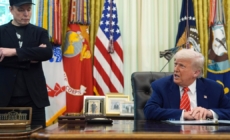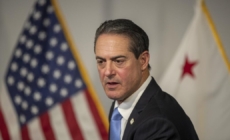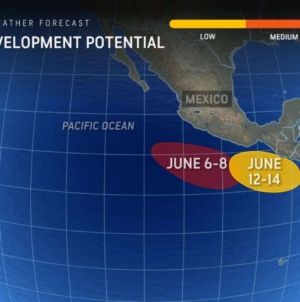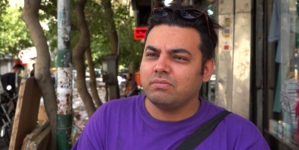-
UCLA Chancellor Julio Frenk vows to restore campus trust amid ‘nervousness and anxiety’ - 15 mins ago
-
Trump threatens to cut off Elon Musk’s federal subsidies. That could cost Tesla and SpaceX billions. - 24 mins ago
-
Aaron Rodgers’ most notable accomplishments, moments of NFL career - 32 mins ago
-
Map Shows Timeline of Two New Tropical Storms - 36 mins ago
-
Orange County DA retaliated against female prosecutor, jury finds - 54 mins ago
-
Military parade in Washington, D.C., could disrupt flights at Reagan National Airport - about 1 hour ago
-
Americans Filing for Social Security Surges to Record High Amid Cut Fears - about 1 hour ago
-
With Aaron Rodgers, where do Steelers stand in AFC pecking order? - about 1 hour ago
-
Torrance boy, 9, detained by ICE for planned deportation to Honduras; community outraged - 2 hours ago
-
Florida man convicted in 2004 cold case death of victim whose remains have not been found - 2 hours ago
What Our Obsession With ‘White Lotus’ Says About Us | Opinion
HBO’s The White Lotus is as hypnotic as it is unsettling. Created by Mike White, the anthology series captures the twisted allure of the ultra-wealthy as they unravel in paradise. It’s a show about wealth, privilege, and power, but instead of asking us to sympathize with its characters, it pulls us in to watch—sometimes in awe, sometimes in horror—them self-destruct.
But why can’t we look away? The White Lotus isn’t just a critique of the rich. It’s a mirror to our own complicated relationship with them. In an era of wealth inequality, we remain obsessed with the lifestyles and scandals of the elite. Tabloid sources like TMZ and The Shade Room thrive on it, and shows like The White Lotus tap into our paradoxical feelings—resentment, envy, and the guilty pleasure of watching the privileged unravel.
The gap between the rich and the rest of us is wider than ever. The top 1 percent control nearly half of the world’s wealth, while billions struggle to get by. Despite, or perhaps because of this, we consume media that both glamorizes and critiques the wealthy. The White Lotus forces us to confront this ugly reality without the usual filters.
Billy H.C. Kwok/Getty Images for HBO
Unlike other shows about the elite, The White Lotus doesn’t romanticize luxury. The resorts are stunning, the views breathtaking, but they mask a deeper rot. These characters, despite their designer labels and extravagant lifestyles, are often miserable, insecure, or self-destructive. They aren’t aspirational they’re cautionary tales. And yet, we keep watching.
One word comes to mind when watching The White Lotus: Schadenfreude. It’s that German term for the pleasure we take in witnessing another’s misfortune. I first encountered it while reading Psychology Today to understand why we’re so drawn to reality TV. The White Lotus taps into this instinct, not by making us revel in the downfall of the rich, but by letting us observe their drama and self-destruction from a safe distance, without consequences or guilt—after all, these are just characters.
Take season two, for example. Harper (Aubrey Plaza) and Ethan (Will Sharpe) have it all—youth, looks, successful careers. Yet their relationship is riddled with emotional turmoil, proving wealth doesn’t shield them from intimacy issues. The unresolved nature of their storyline sent social media into a frenzy. No wonder season two has the highest audience score on Rotten Tomatoes.
Then there’s Tanya McQuoid (Jennifer Coolidge), who was the show’s only returning character in the second season. Despite her wealth, Tanya is deeply lonely, easily manipulated, and perpetually searching for belonging. Her tragic arc in season two is a reminder that money can’t buy happiness, intelligence, or even survival. Her assistant, Portia (Haley Lu Richardson), echoes a belief many share: “If I had her wealth, I wouldn’t be as miserable as her.” But would she? Would any of us? The White Lotus forces us to confront this uncomfortable question.
Consider the Mossbachers from season one, liberal-leaning and wealthy, they believe their politics make them “good” rich people. Yet their entitlement is no different from the characters they judge. Mark Mossbacher (Steve Zahn) starts off as sympathetic due to his health concerns and family issues, but his dismissive response to local performers exposes his blind spots.
Even while we enjoy watching the rich unravel, the show forces us to confront our own contradictions. Many of us dream of financial freedom, escaping the grind, and living in luxury. We mock influencers on yachts but keep their content trending. We criticize the ultra-rich but can’t get enough of media about them. The White Lotus plays with this tension, never letting us feel morally superior for too long.
Even the hotel employees, the presumed moral center of the show, aren’t purely sympathetic. Belinda (Natasha Rothwell), the Maui spa manager in season one, starts as a grounded, compassionate professional who genuinely cares about wellness. But when Tanya dangles the promise of funding her wellness business, Belinda becomes fixated on the opportunity. Her stress from catering to entitled guests shifts into tunnel vision, leading her to prioritize her business plan over Tanya’s emotional needs. She’s the character many viewers might identify with, until we see how desperation clouds even the best intentions.
As season three draws near an end, set in Thailand, the series continues to dissect wealth, privilege, and moral decay. Mike White has hinted at themes of “death and Eastern religion,” suggesting the season will tackle not only financial power but also spiritual emptiness. This raises an interesting question: How do wealth and faith coexist? And what happens when they don’t?
What keeps The White Lotus fresh is its refusal to follow the traditional “eat the rich” narrative. It doesn’t tell us how to feel. It simply holds up a mirror and lets us decide. It’s satire, but it’s not far removed from reality. The characters may be exaggerated, but their entitlement, anxiety, and moral gymnastics are all too real.
In a world where economic disparity is growing and the rich seem more untouchable than ever, The White Lotus offers a way to process our collective frustration. It’s voyeuristic, cathartic, and uncomfortable. But perhaps the most compelling aspect of the show is how it forces us to reflect—not just on the characters but on ourselves. We question, “Would I have done that?” The show reveals that while wealth and access can fuel certain struggles, the real issues stem from within, from our morals, our choices, and our relationships. In this sense, The White Lotus holds us accountable. And that’s why we can’t look away.
Felipe Patterson is a freelance writer and entertainment journalist who has written for Watercooler HQ, Taji Mag, GQ South Africa and other outlets. He writes about film, television, and culture.
The views expressed in this article are the writer’s own.
Source link






























